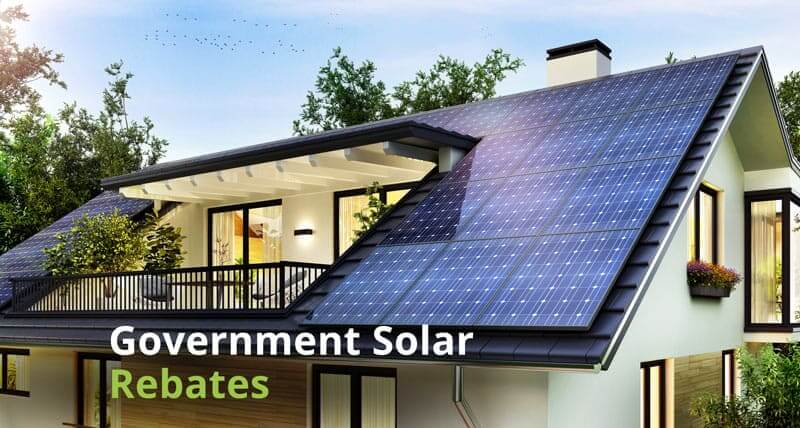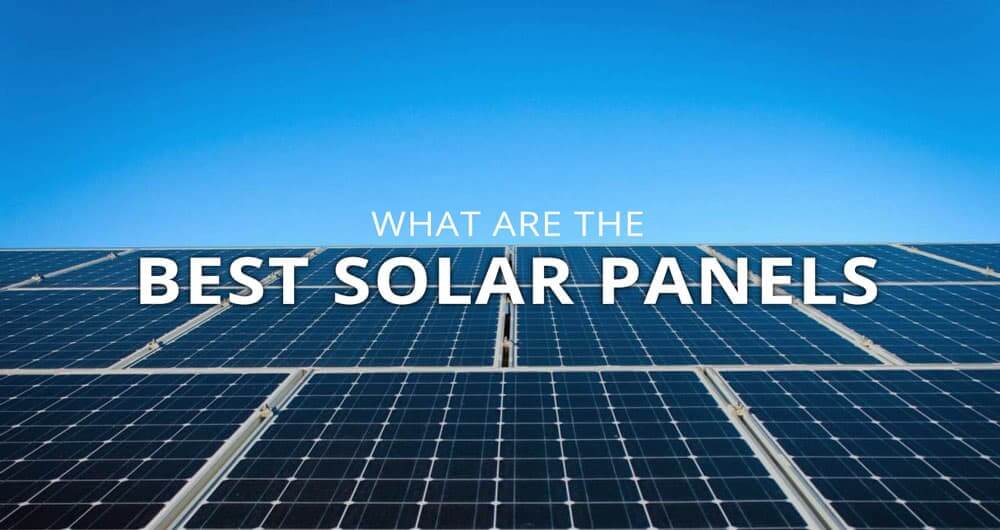Home Do Solar Panels Work in Winter?
Do Solar Panels Work In The Winter?
When considering the shift to solar power, the main concern for homeowners is assessing how well solar panels perform during colder months. In areas where clear skies are a bit scarce and one can anticipate the odd shower or snowfall, it’s crucial for individuals to understand that solar panels continue to be effective throughout the year.
Solar panels do work during the winter, but the energy production is reduced1 by 32% on average. The lower power output is due to the reduced number of hours of sunlight during a winters day and the sub-optimal angle of the sun.
Winter power production has been taken into account when sizing a solar panel system for your needs, so you will still produce enough electricity to cover your power needs.
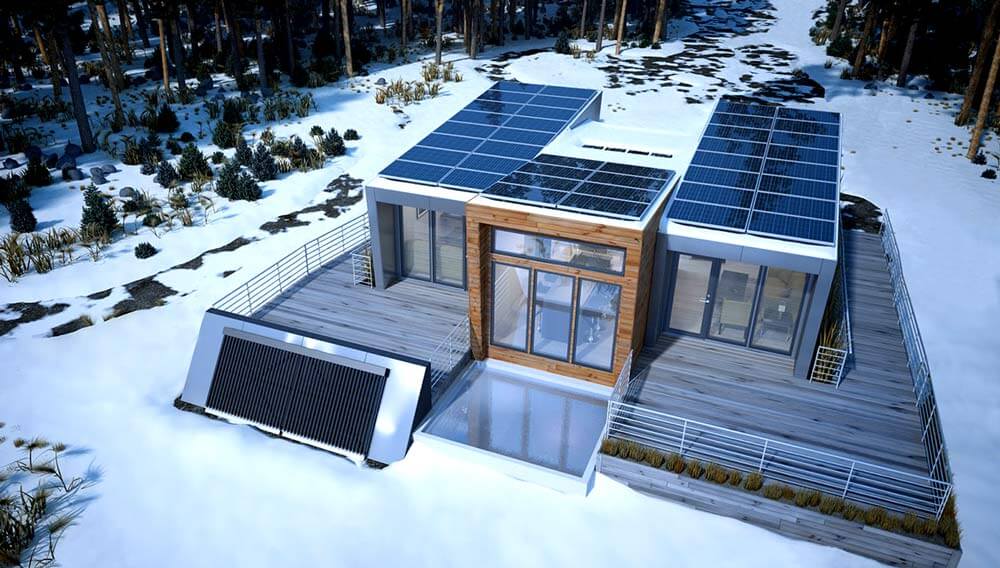
Table of Contents
ToggleDo solar panels work better in colder weather?
We just learned above that because of shorter hours and lower angle of the sun reduce the output of the solar panels in winter but do lower temperatures compensate with increased efficiency? Yes or no?
Energy production efficiency is higher in cooler temperatures because, as research shows, solar panels work best in temperatures lower than 25 degrees. The lower the temperature, the better their efficiency. For every degree above 25°C, a solar panel’s output can decrease by around 0.3% to 0.5%2, affecting overall energy production.
Once the air temperature is greater than 25 degrees celsius, the efficiency of solar panels begins to drop. For every degree above 25 solar panel efficiency drops by 0.5%. So when the air temperature is at 35 degrees, solar panel efficiency drops by 5%3.
During summer, the high temperatures reduce the efficiency of your panels, which affects their output.
Nevertheless, the panels’ total output is usually lower in winter.4
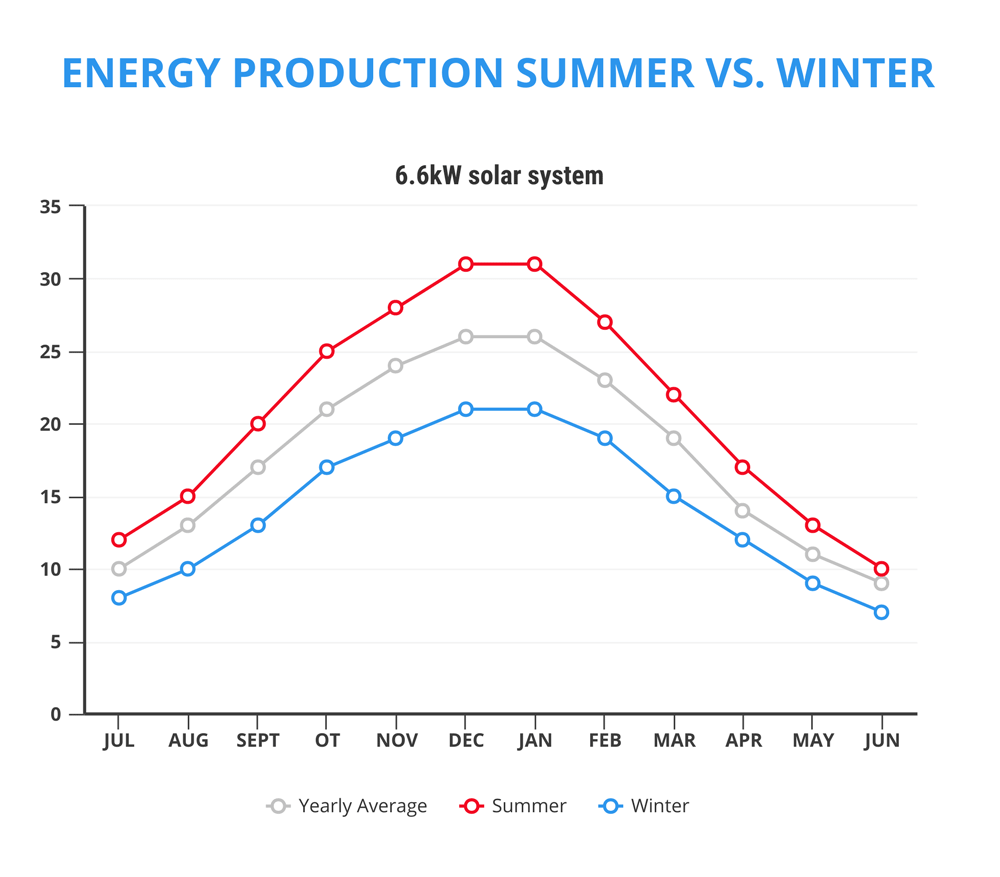
Solar output summer vs. winter
Now that we have established that solar panels generate more power during the summer than they do in winter, let’s look at some of the factors that cause it, and the actual output figures of a solar system.
Hours in the day
Solar panels generate more electricity when they’re exposed to more hours of sunlight. During summer, starting late November to February, the days are longer, and thus solar panels get up to 6 more daylight hours. This translates to more electricity generation.
In winter, June to August, the days are shorter5, and the sun is slightly lower. Therefore, your solar panels receive little daylight hours, and hence their energy output takes a hit.
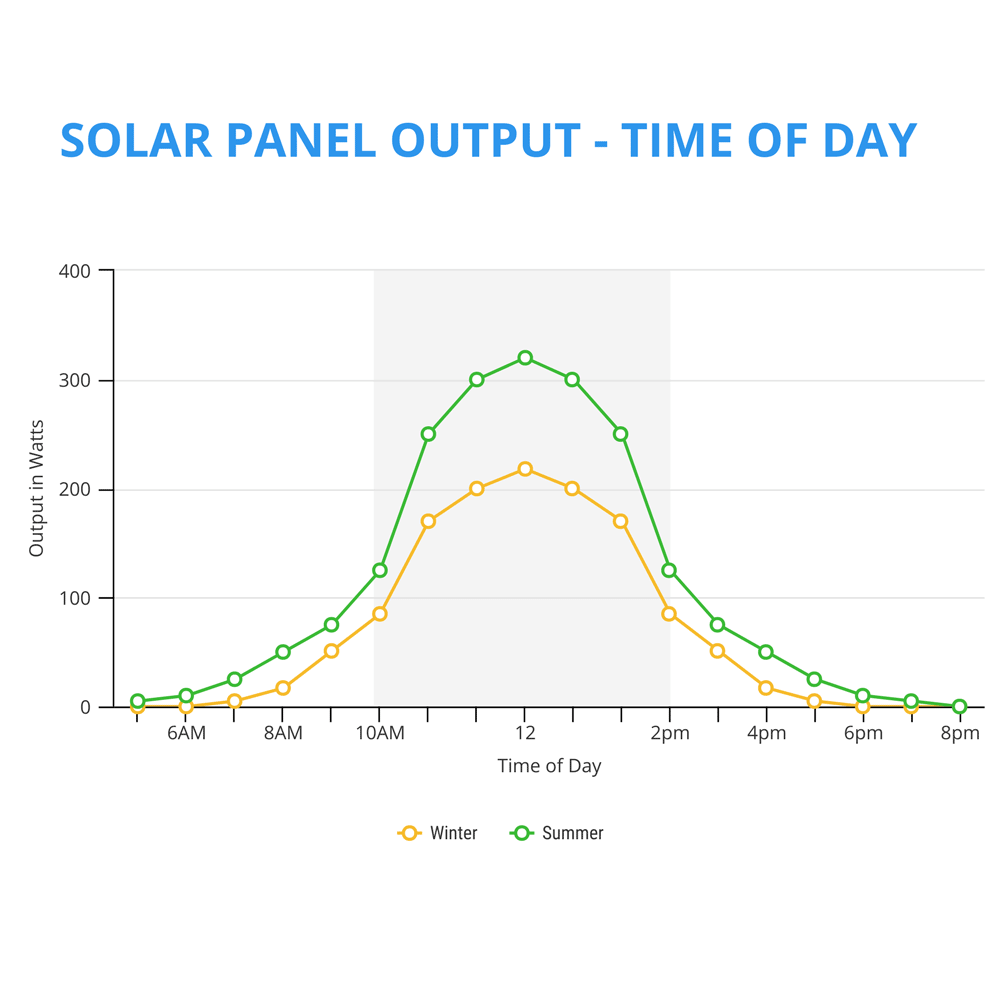
The angle of the sun
As the sun shifts its position throughout the sky, the angle at which its rays hit your solar panels determines how much electricity they generate. Generally, your panels will generate the most energy when they directly receive the sun’s rays.
In summer, the sun is higher, so sunlight reaching the panels is concentrated6. This is why solar panels generate more electricity. Throughout winter, the sun travels a bit slower, so the sunlight reaching the panels is widespread, covering large areas. This means that the direct rays landing on the panel are fewer.
How much less power is produced in winter?
On average, most solar panels generate 32% less in winter than they do during the summer. This, however, is not due to the panels, but your location and light levels.
During summer, a 5-kWh solar system generates 20kW-22kW7 on average per day in Australia. (This may slightly vary depending on the states). In a month, this is almost 600kWh.
During winter, a 5-kWh system generates 5 x 2.6 = 14kWh per day. Monthly, this becomes 390kWh. This indicates a 35% less power production during winter.
Do solar panels work in the snow?
Owing to their smooth surface and tilted fixtures, the snow easily slides off the panels without interfering with energy production.
The only time your panels won’t work is when they’re covered by heavy snow.8 If this happens, consult professional solar installers to advise you on how to get rid of it – in most cases, they’ll tell you to let it melt.
Additionally, most of the panels in the market today were designed with pressure durability in mind. So, your panel can accommodate the weight of snow long enough for it to melt away.
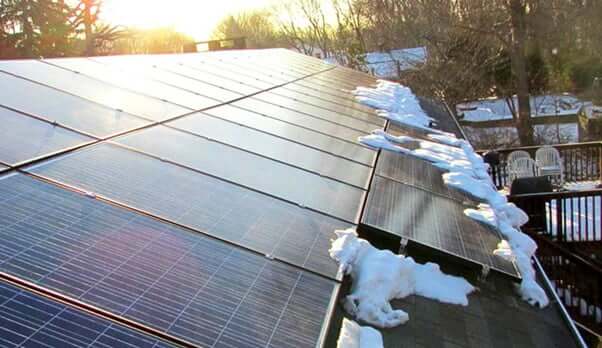
Problems with solar panels in winter
While their efficiency is better during summer, one of the biggest issues with solar panels is their dependability. If you live in an area that gets snowfall, your power production will drop to zero. Snow blocks sunlight from reaching the solar panels, which means they cannot generate power.
If you live in Sydney, your solar panels are exposed to 6 fewer hours of sunlight as opposed to summer. Even with these fewer hours, this is not a huge issue as you can still generate enough power for your home.
Does Lessened Solar Production in Winter Increase Energy Bills?
Not necessarily. Although your production is low, you can use net metering to ensure that your utility bills don’t skyrocket. This is done through the feed-in tariff.
The only real difference is how you heat or cool your home. If you use an air conditioner through the summer but heat your home with gas or an open fireplace, then you will reduce your power bill anyway, so any drop in power production will be mirrored in your energy use.
As you produce power through the day, you can feedback excess into the grid and get credits for this power to use when the sun goes down. Because you are not running an air conditioner while harvesting power (which saps most of your energy), you actually have more excess power to draw on at night. It all seems to balance out quite well.
Speak to your local installer about installing an oversized system. Instead of a 5kWh system, you can install 5 more panels and have a 6.6kWh system to pick up the slack.
Summer and heat trade-off with solar panels
On a hot summer day, you’d expect your solar panels to generate a lot of electricity. However, studies now show that excessive heat is bad for your solar panel’s efficiency. When your panel heats up to over the base temperature of 250C, its efficiency decreases by nearly 0.5% per degree.
During winter, your panels don’t go through this and hence their efficiency remains high.
The good thing about PV solar panels is that they are designed to withstand extreme temperatures. Depending on the brand, some panels can operate at more than 800C hot and up to -400C cold. This means that the chances of heat damage to the panels are extremely low.
The panels only become hot and ‘overheat’ because of the silicon component of the PV cells. As it gets warmer, the cell’s voltage output decreases.
To determine how much voltage your solar panel will drop, look at its ‘temperature coefficient rating.’
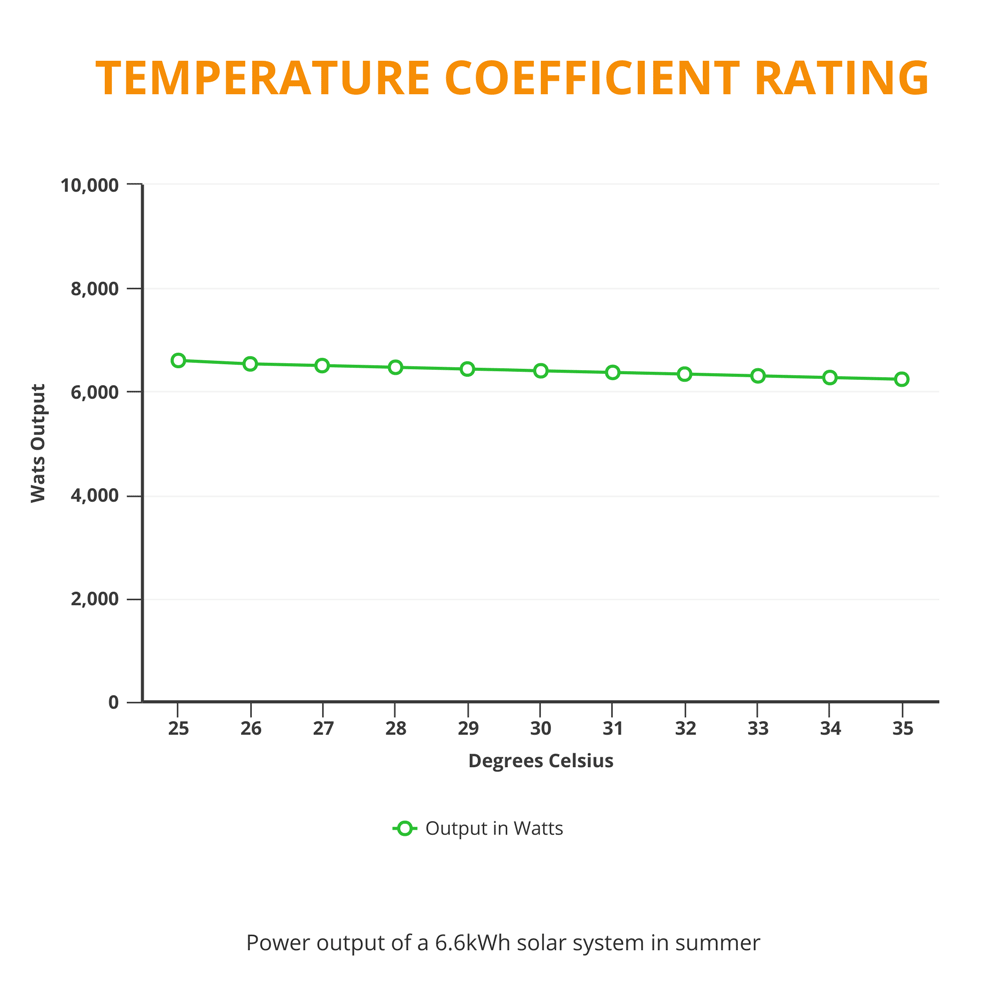
How to get the most out of your solar panels in winter
Since your panels will be exposed to very few sunlight hours in winter, you want to generate as much energy as possible. Here’s how to do this.
Keep your panels clean
Even though your panels are in top shape during Autumn, you shouldn’t take your chances as winter approaches. Find some time to clean your panels and get rid of any dirt that may be lodged on the panel surface. But avoid using harsh chemicals and abrasive tools when cleaning to protect the glass surface.
You should also prune any tree leaves and branches that might cause shading to your panels and do a complete system check to confirm that everything is working well.
Angle your panels to face North
Since the sun is lower, angling your solar panels to face north allows them to trap more sunlight 9. You can check the Clean Energy Council for the precise combinations for plane angles depending on your city.
Reduce energy consumption
During winter, when your solar system generates less energy, you won’t be able to comfortably walk around your home naked with the heating turned up high. You’ll have to start regulating how much power you use per day. Find out the appliances consuming a lot of electricity and ensure that they’re on only when needed.
If you need to use high-consumption appliances like the dishwasher, refrigerator, and dryer, try to use them during the day while the sun is still producing a ton of electricity.
Changing all light bulbs in your home to LED can reduce the power consumption of lights by 75%. According to energy.go.au, 10% of a home’s power10 consumption is by lighting alone, so switching to LED can reduce your power bill by 7%.
Install a battery
During winter, your solar panels become very inconsistent in their electricity production due to the shorter daylight hours. This means that you’ll have days when the electricity produced is lower than your home’s demand, – and that’s when you need a battery.
Installing a battery11 into your system allows you to store the excess energy the panels generate during a good day, taking you a step closer to energy independence.
Get the best feed-in tariff available
Since your solar panels aren’t consistently generating enough power for your home, you will depend on the grid for the extra power. So, to avoid large power bills at the end of the month, look for the best feed-in tariff rates in your area.
Good tariff rates will dramatically reduce your energy bills, and your positive net balance will be a small amount.
FAQ
Do solar panels work better in summer?
In terms of power output, Yes. Solar panels generate more electricity during the summer since the days are longer, so they get more sunlight hours. In terms of efficiency, panels are more efficient during winter but generate less power due to shorter days.
Do you have to clear snow off solar panels?
No. Removing snow from your solar panels is generally frowned upon by many experts as it may nullify your warranty. Solar panels heat up pretty fast, so the snow melts quickly with the sun’s slightest rays.
Can frost damage solar panels?
No. Many manufacturers design their panels to withstand extreme temperatures, whether its heat or cold. So, frost shouldn’t damage your solar panels. The same applies to excess heat. Most panels come with a tolerance rating from the manufacturers; check it before installing it for your home.
- Sun Power, (N.a), Solar Panel Output in Summer vs. Winter | SunPower by Quality Home Services, Accessed on 7th April 2024: https://www.sunpowerbyqhs.com/blog/solar-energy-production-in-summer-vs-winter#:~:text=Less%20output%20is%20produced%20in,summer%20months%20with%20additional%20sunlight.
- ECOFLOW, (2023), The Impact of Temperature on Solar Panel Efficiency: How Heat Affects Your Solar Energy System, Accessed on 7th April 2024: https://blog.ecoflow.com/us/effects-of-temperature-on-solar-panel-efficiency/#:~:text=The%20optimal%20temperature%20for%20solar%20panels%20is%20around%2025%C2%B0,%25%2C%20affecting%20overall%20energy%20production.
- Solarbright,(2023),How Does the Weather Affect the Efficiency of My Solar Panels? Accessed on 7th April 2024: https://solarbright.com.au/how-does-the-weather-affect-the-efficiency-of-my-solar-panels/#:~:text=Essentially%2C%20this%20is%20the%20percentage,5%25%20efficiency%20in%20your%20panels.
- STABLESOLAR,(2029), How Winter Affects Solar Panel Performance, Accessed on 7th April 2024: https://www.stablesolar.com/blog/how-winter-affects-solar-panel-performance
- Energy.Gov, (N.a), Solar radiation basics, Accessed on 7th April 2024: https://www.energy.gov/eere/solar/solar-radiation-basics
- Khan Acadmy,(2023) solar radiation and Earth’s season, Accessed on 7th April 2024: https://www.khanacademy.org/science/ap-college-environmental-science/x0b0e430a38ebd23f:earth-systems-and-resources/x0b0e430a38ebd23f:earths-seasons/a/solar-radiation-and-earths-seasons
- Smarthousesolar,(N.a), 5kW Solar System Brisbane: Price, ROI and Output, Accessed on 7th April 2024: https://www.smarthousesolar.com.au/5kw-solar-system-brisbane-price-roi-and-output
- EnergySageStaff, (2023), Do solar panel work in snow and during winter?, Accessed on 7th April 2024: https://www.energysage.com/solar/solar-panels-in-winter-weather-snow-affect-power-production/
- Stephen J.,(2024), Point your solar panel in the right direction for the most power, Accessed on 7th April 2024: https://www.cnet.com/home/energy-and-utilities/how-to-position-solar-panels-so-they-generate-the-most-energy/
- Department of climate change, Energy, the Environment and water, (N.a), Lighting, Accessed on 7th April 2024: https://www.energy.gov.au/households/lighting
- By Ben McInerney, (2024), How Long Do Solar Batteries Last? Accessed on 7thApril 2024:https://gosolarquotes.com.au/how-long-do-solar-batteries-last/
Table of Contents
Toggle


